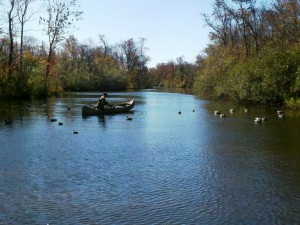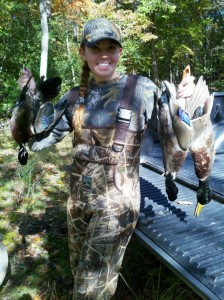We have much more to do and your continued support is needed now more than ever.
America’s Hunters Ask: Where are Clean Water and Healthy Wetlands in the Election Discourse?
Tonight, Congressman Paul Ryan and Vice President Joe Biden will engage in a primetime debate on foreign and domestic issues. We remain hopeful that among the many important topics raised tonight will be a discussion of the protection of America’s air, land, water and wildlife. Unfortunately, we typically need to dig deeper to find the candidates’ positions and conservation agendas—which is why I was thrilled to see an interview with Congressman Ryan in Outdoor Life last week, in which he spoke about several conservation issues (including whether he supports the sell-off of public lands).
For me, the highlight of the interview was the statement Congressman Ryan made in support of the virtues of the Clean Water Act—which for four decades has not only led to more drinkable, swimmable and fishable waters for millions of Americans, but has also played an important role in protecting vital wildlife habitat.
“The Clean Water Act has been helpful too, in making sure that wetlands are protected so that there’s more than a one-for-one replacement in some instances. That’s a good thing. We believe that wetland conservation is a critical part of conservation. Don’t forget that hunters are the best conservationists there are in America.”

Unfortunately, Congressman Ryan has recently cast several votes that would only serve to weaken the Clean Water Act.
This year, he voted against an amendment to the House Energy & Water Appropriations bill that would ensure headwater streams and wetlands enjoy full Clean Water Act protections. The Moran amendment would have struck a policy rider included in the bill to keep the US Army Corps of Engineers from clarifying the definition of waters under the jurisdiction of the Clean Water Act.
And last year, he voted for legislation that would undermine the core of the Clean Water Act’s ability to protect waters and wetlands. Specifically, H.R. 2018 would prevent the federal government from promulgating water quality standards and would remove critical EPA permitting and oversight authority of dredging and filling of wetlands and waters.

As duck season is opening across the country—and sportsmen and women are taking to the field with friends and families—many are reflecting on the quality of their outdoor experiences. Given the countless hours spent hip-deep in our nation’s wetlands, waterfowl hunters understand better than most what curtailing laws like the Clean Water Act would really mean. To the extent that both presidential campaigns want to compete for the support from hunters, anglers and other outdoor enthusiasts they should lay out a clear agenda on how they would better wildlife and wildlife habitat including through enforcing the Clean Water Act.





















